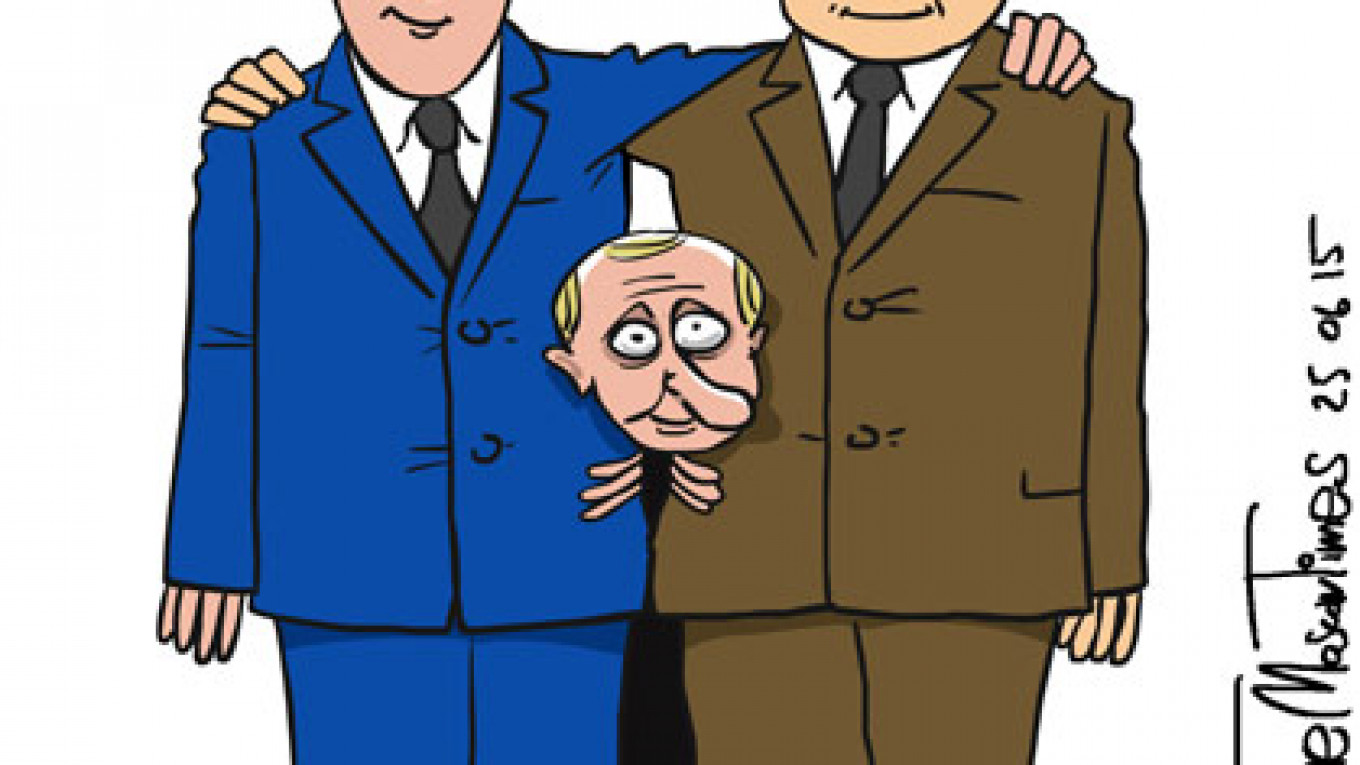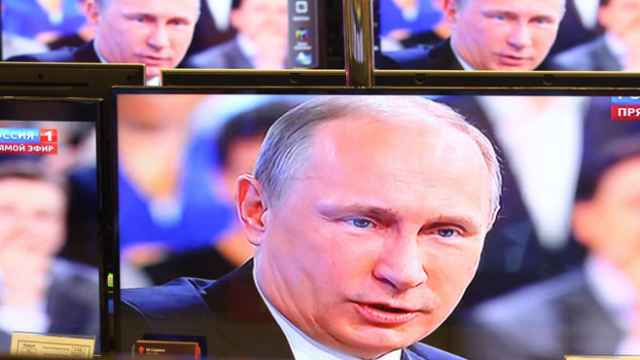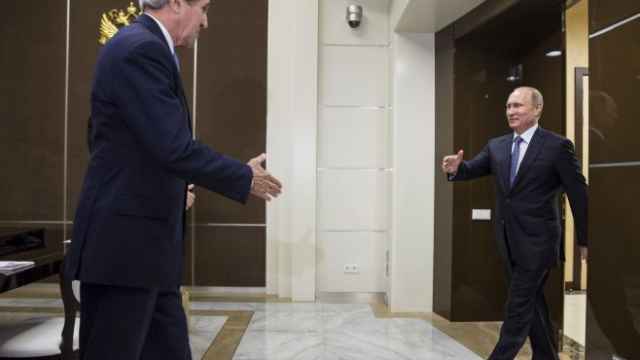The global confrontation during the Cold War years came to be known as a "conflict between East and West." Both concepts have geographic origins, but they soon came to include a political and ideological content as well. It is interesting that, although that rivalry encompassed the entire globe, that name refers exclusively to the standoff that arose between Eastern and Western European states following the end of World War II.
It seemed as if former Soviet leader Mikhail Gorbachev's "new political thinking" had erased that line of confrontation, with the fall of the Berlin Wall symbolizing that change. Now, 25 years later, the world is talking of a new wall, this time between Russia and Ukraine, between warring communities in the Donbass — the latest line of demarcation in Europe.
Has the situation come full circle? No, because despite all of the tragic events in Ukraine, there is no escaping the feeling that the situation there is somehow parochial, that this obsession with peripheral matters is only a distraction from much larger and more important processes. And that is connected with the fact that the East is becoming a single entity — politically, geographically and culturally. In today's world, the East is essentially Asia, with China leading it.
Russia has always loved juggling the concepts of East and West to try out the different roles it can play between them. However, Russia was never truly "in between" East and West during the last three centuries of its modern history. Up until the 20th century, Russia was an integral part of larger European politics, with China and the rest of Asia playing only an ancillary role as an arena for playing out various European intrigues.
However, in the 20th century Russia itself came to embody the East and acted as one side in a prolonged confrontation in which Asia remained on the sidelines, at least compared to the passions that seethed in the Euro-Atlantic region.
Undoubtedly Russia is now in an intermediate state. Unlike its initial intentions in the early 1990s, it refuses to become part of the West, and yet it cannot embody the new East because Moscow has only a limited ability to dictate the regional agenda. What's more, the cultural composition of the East is now more clearly delineated than before: it centers on China and its culture, which is very different from Russia's.
Russia experiences both opportunities and dangers with its position between East and West. However, the argument that it is turning into a raw materials appendage of China and has therefore compromised its freedom is a purely subjective evaluation based on ideological considerations.
For some reason, the same observers contend that for Russia to serve as a raw materials appendage of the European Union brings development and progress, but that the same relationship to China will inevitably drag Russia into the abyss of backwardness.
The general consensus is that Russia will act as a junior partner to China because its economy is so much smaller. However, the same relative disparity in economies exists between Russia and the West, and yet this country is not considered a junior partner in those relations.
This is primarily due to Russia's more devil-may-care psychology and its ability to play the diplomatic game — the latter of greater importance with China. In fact, Russia's long tradition of superpower expansion gives it a certain advantage compared to the cautious and even timid foreign policy of China.
In contrast to the EU and the U.S., China does not try to impose its ideas about how to live on others. However, this is partly due to an arrogance that surpasses even that of the West. China is certain of its own exceptional nature. Beijing believes that because foreigners are incapable of grasping Chinese culture and philosophy, there is no point in trying to instill it into them. It is therefore best just to let them live as they please.
That has a flip side too. Russia and China have not interacted closely for some time, and now the active phase of that work begins. The documents that President Vladimir Putin and Chinese President Xi Jinping signed in May form the basis of a truly strategic partnership.
Cultural conflicts are inevitable: The Russians and the Chinese do not know or understand each other well and have yet to build up the experience of daily interaction. It is easy to see that tensions will increase, but at the same time, that is a necessary part of building long-term relations.
Contrary to the simplistic picture that commentators often draw, Russia is not choosing between the East and the West: it needs both in order to achieve balanced development. But there is another factor at play here too.
What we are witnessing is not just Russia pivoting toward the East — belatedly and slowly as always — but also China pivoting toward the West. And once Beijing reaches a decision, it always begins carrying it out with incredible determination.
There are several reasons for this. First, it is a reaction to the rapidly growing resistance that China meets after every step it takes in the Asia Pacific Region. And despite its interdependence with China, Washington is switching to a policy of containment with Beijing. The situation in Eurasia is much more favorable for China.
Second, China needs to improve the underdeveloped western and northwestern regions of the country. China is extremely concerned about any internal imbalances that could undermine the country's stability.
Third, as a superpower exporter, China wants to establish the shortest and most profitable connection to the markets of Europe, the Mediterranean and beyond. That is the reason behind the slogan that started it all: the New Silk Road.
China is willing to invest heavily in needed infrastructure. At the same time, it hopes to avoid all political aggravations and shies away from all conflict zones in Eurasia. When the Chinese speak about harmony, they are not dissembling: they want to "sidestep" every regional conflict to more quickly achieve their goals.
For example, Beijing carefully avoids arousing suspicion of trying to increase its political influence in Central Asia, demonstratively conceding to Russia. The economy is another matter. In that sphere, Beijing is unconcerned whether Moscow takes offense that it is lagging far behind.
Russia's pivot to the East is an objective necessity. If Moscow had begun it a few years ago when it first brought up the idea, the balance of power would have been more favorable. On the other hand, China was not yet ready at that time to seriously pursue its own "pivot to the West."
In any case, Russia remains a key part of that strategy, at least for geographical reasons. What happens further depends on Russia itself — will it remain simply a transit zone for other rising economies, or will it manage to use that growth to its own advantage?
Fyodor Lukyanov is editor of Russia in Global Affairs.
A Message from The Moscow Times:
Dear readers,
We are facing unprecedented challenges. Russia's Prosecutor General's Office has designated The Moscow Times as an "undesirable" organization, criminalizing our work and putting our staff at risk of prosecution. This follows our earlier unjust labeling as a "foreign agent."
These actions are direct attempts to silence independent journalism in Russia. The authorities claim our work "discredits the decisions of the Russian leadership." We see things differently: we strive to provide accurate, unbiased reporting on Russia.
We, the journalists of The Moscow Times, refuse to be silenced. But to continue our work, we need your help.
Your support, no matter how small, makes a world of difference. If you can, please support us monthly starting from just $2. It's quick to set up, and every contribution makes a significant impact.
By supporting The Moscow Times, you're defending open, independent journalism in the face of repression. Thank you for standing with us.
Remind me later.








